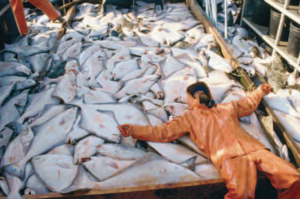The tragedy of the commons explains why ocean fisheries are prone to overuse (Hardin1968).1 The good news is that individual fishing quotas, called IFQs or ITQs (for individual transferable quotas), have overcome this tendency in a growing number of fisheries around the globe. I am currently working with the Reason Public Policy Institute and Environmental Defense to educate policy makers, fishing groups, and the public about them (see www.ifqsforfisheries.org).
In our enthusiasm for individual fishing quotas, however, we should be aware of the possibility that poor design of an IFQ program could lead to the tragedy of the anticommons. This idea was popularized by Michael A. Heller (1998) to depict the exact opposite of the tragedy of the commons. It occurs when there are many owners of a resource, each with a right to exclude another person from using it. Just as the tragedy of the commons leads to overuse, the anticommons typically leads to underuse.
The original example used by Heller was Moscow retail store property after the fall of the Soviet Union. As commerce emerged in Russia, numerous well-stocked kiosks dotted the streets. Yet many of the stores along city streets in Moscow remained empty. Stores were better sites for enterprise, but something held back their use. Heller (1998, 636) argued that the property rights associated with store property were a confusing array of arcane property rights mostly linked to the previous Soviet regime. Ownership might be shared by local, regional, or national governments, occupants (which could be a workers’ cooperative), and others such as government regulators and “balance sheet holders.”
Each rightholder had veto power-the right to block the use of a store without the holder’s permission. Even though it was potentially in the interest of each owner to obtain value from the store, getting this heterogeneous set of owners to agree on store use was next to impossible. As a result, many Moscow stores remained empty for most of the 1990s.
This concept can be applied to ocean fisheries. For decades, governments have tried to avoid the tragedy of the commons through regulations. They have limited season length, constricted the areas open to fishing, dictated types of gear and the size and power of vessels, and set a minimum size for landed fish. These approaches have not eliminated overfishing, nor have they prevented the enormous waste and hazards of the destructive race for fish.(2)
With IFQs, however, each fisherman is entitled to catch a specified portion of the total allowable catch3 that is set each season by fishery managers. The fisherman can take the quota when he wants to, and the race to fish disappears. Because the quota shares are transferable, current holders can adjust the size of their fishing operations by buying and selling quota shares, or even retire from the business.
New Zealand and Iceland now use individual quota programs to manage nearly all their commercial fisheries. Canada, Australia, the United States, Greenland, and the Netherlands use them for some fish species. Overall, these programs have generated higher incomes for fishermen, improved product quality, reduced fleet excesses, and nearly eliminated instances where the actual harvest exceeded the total allowable catch (see, for example, De Alessi 1998; Repetto 2001; Wilen and Homans 2000).
The Alaska halibut fishery illustrates the improvements. Under the old regulatory regime, the seasons got shorter and shorter, but fishermen still tried to catch as much as they could as quickly as they could, and the overall harvest often exceeded the total allowable catch. By the early 1990s, halibut fishermen could fish during just two or three 24-hour periods a year.
When IFQs were adopted in 1995, the fishing season lengthened to more than eight months a year. Fishermen could sell more fresh fish and receive higher dockside prices (General Accounting Office 2002, 21). Safety improved and gear loss declined (Hartley and Fina 2001, 34). Actual harvests no longer exceed the total allowable catch each season (Dinneford et al. 1999). Fleet excesses were reduced as well.
Alaska crab fisheries are among the next in line for IFQs. The reasons are obvious: The fishing season is short, down to less than a week per year. Fishermen deliver all of their catch to processors at once, resulting in a glut of crab and lower prices. The hectic pace of fishing increases fishing costs, complicates management of the fish stocks, and increases danger for fishermen.
IFQs have been proposed, but there is a catch. Congress has authorized an additional factor, IPQs or individual processing quotas. That’s where the anticommons comes in.
Processors-the companies that receive and process crab meat brought to the dock-can be hurt when fishermen shift to IFQs. With longer seasons, fishermen will be able to bring in crab when prices are high, and processors will no longer be processing huge quantities of crab all at once. The expensive refrigeration equipment that some invested in may become unnecessary, at least in the short term.
To aid these processors, Senator Ted Stevens of Alaska pushed an appropriations rider earlier this year that requires IPQs as a prerequisite for IFQs in the crab fisheries. Under the requirement, fishermen will have to sell most of their catch to certain processors. In one crab fishery, for example, ninety percent of the catch must go to eight processors (North Pacific Fishery Management Council 2002).
With the supply of crab guaranteed, processors may experience the anticommons. Even though market prices will be higher for fresh crab, they may prefer lower returns to idling some of their costly processing and storage capital (Matulich, Mittelhammer, and Reberte 1996). Fishermen locked into less-than-competitive prices too may join the anticommons. They may find the prices too low to justify harvesting all the outstanding quota shares. Some of the shares may go unused.
Already in the Alaska halibut fishery, we have seen that too many restrictions on IFQs can lead to underuse. The initial rules prohibited selling quota shares if they were less than 20,000 pounds. The goal was to protect small part-time fishermen by preventing a large operator from buying up a lot of small shares. But some quotas were simply too small for their owners to use them. (This led to redesign of the program.)
In sum, IFQs are an important solution to the tragedy of the commons. But we should examine how well these programs are being implemented. One of the problems to watch for is the tragedy of the anticommons.
NOTES
1. Note that economist H. Scott Gordon (1954) examined commons problems in the fishery nearly a decade and a half earlier.
2. For examples, see Leal (2002).
3. The total allowable catch is generally the maximum amount of fish that can be caught in a year without depleting the resource.
REFERENCES
De Alessi, Michael. 1998. Fishing for Solutions. London: Institute of Economics Affairs.
Dinneford, Elaine, Kurt Iverson, Ben Muse, and Kurt Schelle. 1999. Changes under Alaska’s Halibut IFQ Program, 1995 to 1998, November. Online: www.cfec.state.ak.us/research/ H98_TS/h_title.htm. Cited: June 12, 2001.
General Accounting Office. 2002. Individual Fishing Quotas: Better Information Could Improve Program Management. GAO-03-159. Washington, DC, December.
Gordon, H. Scott. 1954. The Economic Theory of a Common Property Resource: The Fishery. Journal of the Political Economy 62(April): 124-42.
Hardin, Garrett. 1968. The Tragedy of the Commons. Science 162(December): 1243-48.
Hartley, M., and M. Fina. 2001. Changes in Fleet Capacity Following the Introduction of Individual Vessel Quotas in the Alaskan Pacific Halibut and Sablefish Fishery. In Case Studies on the Effects of Transferable Fishing Rights on Fleet Capacity and Concentration of Quota Ownership, ed. Ross Shotton. FAO Fisheries Technical paper 412. Rome: FAO. Online: www.fao.org/DOCREP/005/Y2498E/Y2498E00.HTM (cited August 2004).
Heller, Michael A. 1998. The Tragedy of the Anticommons: Property in the Transition from Marx to Markets. Harvard Law Review 11: 621-88.
Leal, Donald R. 2002. Fencing the Fishery: A Primer on Ending the Race for Fish. Bozeman, MT: PERC. Available: live-perc-wp.pantheonsite.io/pdf/guide_fish.pdf.
Matulich, Scott C., Ron C. Mittelhammer, and Carlos Reberte. 1996. Toward a More Complete Model of Individual Transferable Fishing Quotas: Implications of Incorporating the Processing Sector. Journal of Environmental Economics and Management 31: 112-28.
North Pacific Fishery Management Council. 2002. Summary of the Bering Sea and Aleutian Islands Crab Rationalization Program. Anchorage, Alaska, August. Online: www.fakr.noaa.gov/npfmc.
Repetto, Robert. 2001. The Atlantic Sea Scallop Fishery in the U.S. and Canada: A Natural Experiment in Fisheries Management Regimes. Discussion paper. Yale School of Forestry & Environmental Studies, April 15.
Wilen, James E., and Francis R. Homans. 2000. Unraveling Rent Losses in Modern Fisheries: Production, Market, or Regulatory Inefficiencies? Paper presented at Western Economics Association 74th International Conference, Vancouver, BC, June 30-July 3.
Donald R. Leal is a senior associate of PERC and editor of Evolving Property Rights in Marine Fisheries (Rowman & Littlefield, 2004), among other books.




